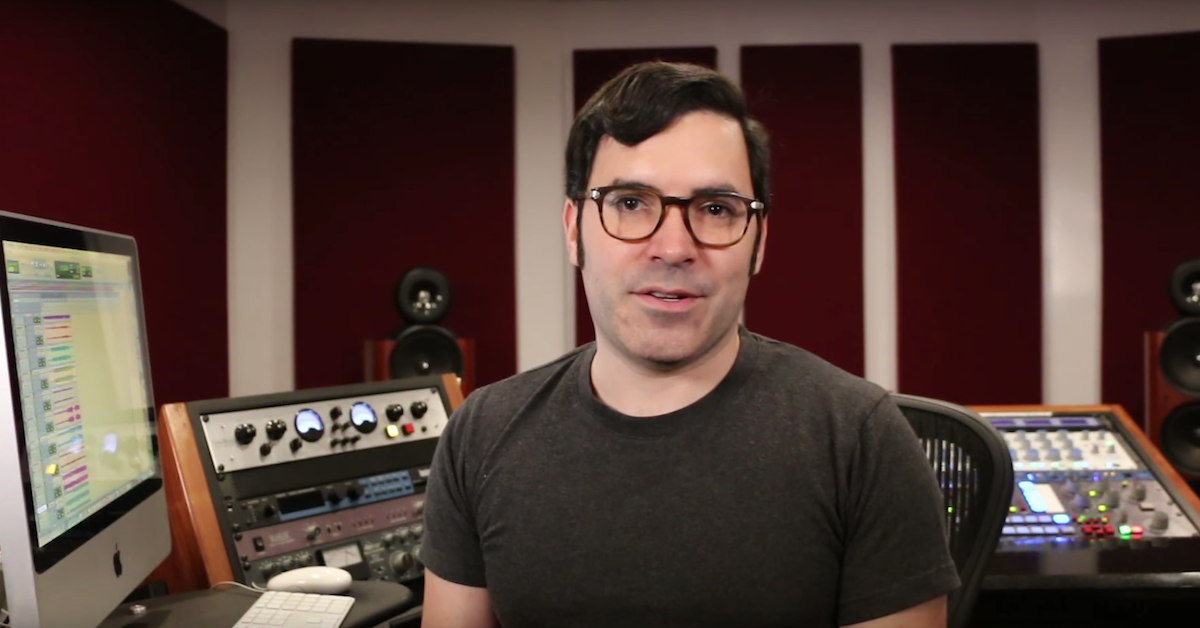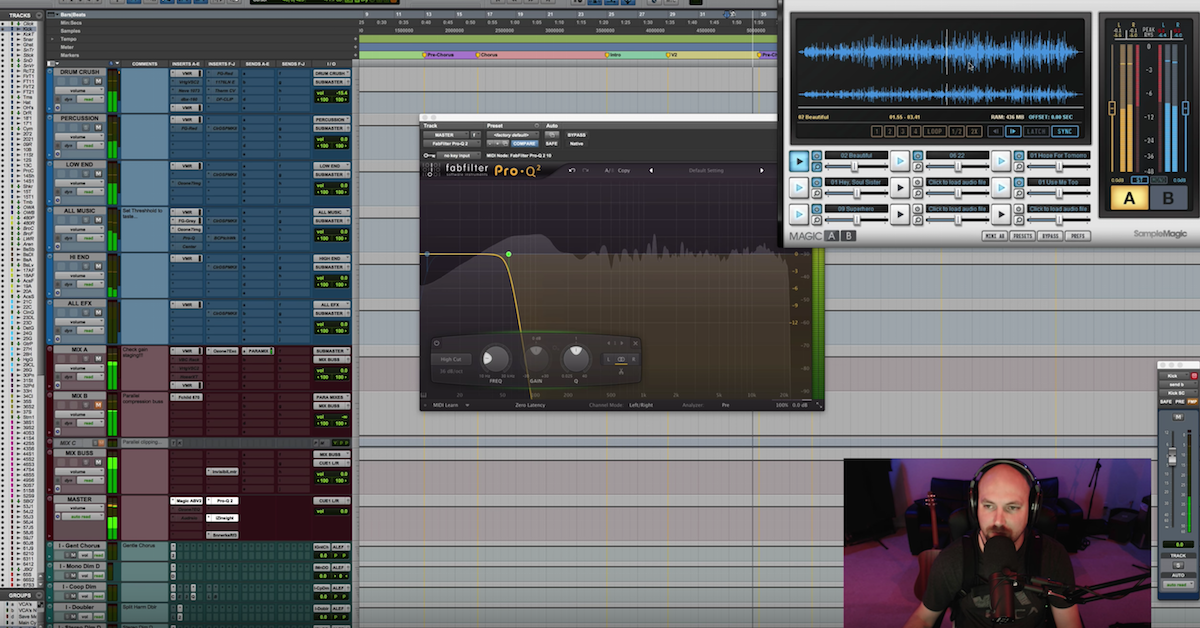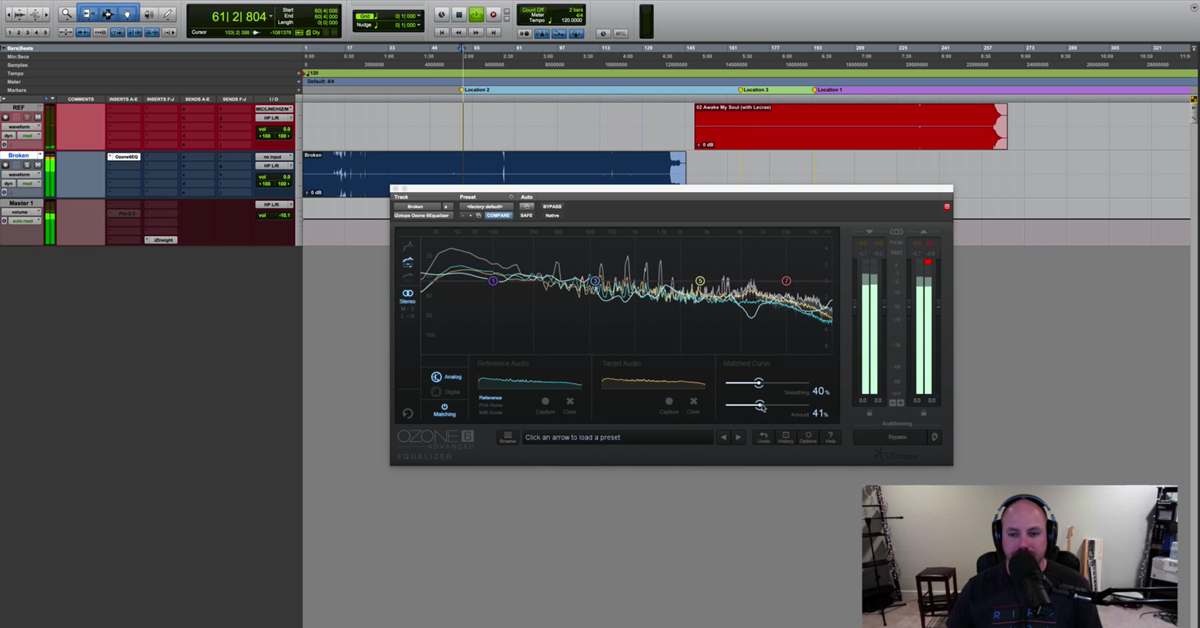Can You Master Your Own Mixes?
That subject? Can you master your own recordings? And the answer is — well first of all, I’m biased, right? Because other people pay me to master their recordings, but I also want to be honest with you, so the answer is yes you can master your own recordings.
By one definition, it’s actually very easy to master your own recordings. By another definition however is literally impossible to master your own recordings. So what does that mean? Well first we’ve got to figure out what the definition of mastering is.
So by the simple definition, mastering is just creating the final format from which you’re going to make your copies. Your commercial copies that you’re going to distribute.
Whether that’s online or through brick and mortar stores, or whatever it is. Back in the day, this was a very involved process, right? People were mixing to tape, and you’d take all of these disparate tape mixes and get them onto the primary distribution channel of that time, vinyl records, right?
So someone had to cut an acetate — this is a very involved, tedious process. Most people who were mixing records don’t want to do this part of the process. It’s very technical and difficult to do, and you had to take all of these disparate tapes and get them on one record. That was your master from which you’re going to stamp out copies.
But today, obviously, the technology is a lot simpler and easier. If you have Pro Tools or Logic, or a free version of GarageBand with your Mac, you can spit out the right resolution file, and you can even drag it into iTunes and put in your titles, your song names, your album names, your artist name, so creating the master is actually really easy.
But there’s another second piece of mastering that mastering engineers did almost as an ancillary kind of add on, and that was while they were getting all of these different mixes onto the one final add on, they would add maybe EQ. Some songs sounded nice with a slight bass boost, and others needed the bass brought down a little bit.
On one song, you might need a slight treble boost, and on another, you might bring down the treble a little bit. You might add compression and excitement and hype and depth and width.
That’s really the remaining value in mastering, but the remaining value in mastering is not just that sweetening, because anybody can do that sweetening, and those tools can be part of your mixing process.
The remaining value of mastering engineers is that you have a separate person who is not the mix engineer doing those tweaks in a room that is especially suited to the task.
It’s kind of a third-party, independent QC of your mixes. It’s someone double checking your work and making sure your mixes sounding as great as you intended them to sound, and hopefully a little bit better still.
So on a really, really great mix, what the mastering engineer might do could be very, very slight. Maybe it’s just bringing down the bass by a dB because it’s a little hot in one spot, and we’re able to check that out in a room that’s perfectly balanced to uncover those little details.
But it could also mean a lot more than that. It could mean you might have problem frequencies, or there might be resonances in your mixing room that we could help you discover.
Now why do you need an independent third party to do this? Well the answer there is you don’t really need anything technically, but I think the reason is you might want one. So here is some of the basic challenges facing mixing engineers. Bass in the room is number one.
Right now, I’m writing an article series for Joe Lambert Mastering on mix tips for your mastering engineer, and item number one is low end for a reason, right? In many mixing rooms, you could be sitting over here listening, and the bass sounds nice, and you move over here and the bass disappears. Like, six inches.
It changes wildly. That’s because of room modes and room nodes and most rooms that folks are mixing in are not as balanced as one like this, where the bass is just even from space to space in the room. That’s by design. That’s something a great mastering room needs to do.
Similar things can happen with the high frequency if you don’t have an appropriate balance of absorption versus diffusion.
You can make what seem like great choices for the high frequencies for your room, and you take it to other places and it doesn’t translate as you expect.
Another thing to remember is if you’re mixing on even really nice mixing speakers that cost more than $1,000, $1,500, $2,000 speakers, without fail, they’re not going to have the kind of completely even balance that you’re going to find in mastering speakers, and to a degree, your mixes will sound like the inverse of your speakers.
Think about this for a second. If you have very bright speakers, or even just slightly bright speakers, your mixes are going to sound a little dark in the end, right? Because your speakers are giving you this extra shimmer and shine and high frequencies, so you’re not pushing those things.
By contrast, if you have speakers that sound a little bit dark, again, your mixes will sound a bit like the inverse of your speakers, where you may push the high frequencies a little bit more than you intend or realize.
If you have speakers that sound very kind of scooped and hyped, you’re probably going to end up with mixes that sound a little kind of flat and boxy and dull and boring.
Meanwhile, if you have speakers that really push that mid-range forward so you make sure that things fit there and sound excited without sounding cluttered or annoying or piercing, you’re probably on speakers where you’re not going to hear the low or high end appropriately, and you have the same issue again.
So in the mix room, multiple speakers can help. I have more details about this on the Joe Lambert Mastering blog, mixing tips from your mastering engineer.
But even if you get this really well settled, there’s still tremendous value in having your mixes heard in a great listening environment on these kind of amazing speakers where you’re going to make choices that are going to translate everywhere. You can say with confidence, “Yeah, we got it. We finished this record. We were able to with great detail and precision make those last few choices without ever having to second guess ourselves ever again.”
That kind of confidence and peace of mind you get out of a space like this, and you get out of working with someone who’s listened to so many masters in one space. You’re only going to get that out of that situation, you’re not going to get it out of just making things louder, or EQing things yourself in the same mix room that you mixed the damn thing in, right?
So there’s the answer to the question. By one definition, if mastering just means creating the final format you’re going to make copies from, yes. Anyone can master, and you can master something you recorded or mixed or whatever, but if mastering means an independent QC by someone who specialized in that end of the process, in a room specifically devoted to that task and designed for that task, if that’s what mastering means, then it’s literally impossible to master your own recordings.
I encourage you to learn more about the mastering process and even try it for if their mix is kind of junior to you, who look up to you and respect you and they’re always asking you for tips, you can try mastering some of their stuff. You might even just feel comfortable doing the last bit of the mastering process for kind of lower budget projects and it might turn out great.
But I encourage you, it doesn’t have to be me, sit down with a mastering engineer in a room like this one, and hear your mixes for the first time in the kind of detail you’re going to get out of the space.
I’m amazed when clients come in and they sit down on the couch and I’ll be kind of doing my thing, and I’ll start to get worried, because I’ll think that they’re really bored, because it’s really quiet behind me, and they’re not saying anything, and I’m like, “Oh my god, this is the most boring thing in the world watching me twiddle these knobs,” and I’ll turn around, and their jaws will just be [mimes open jaw] dropped.
It’s just because it’s an amazing environment to listen to music in, and it’s not an amazing environment because these speakers are hyped up and meant to dazzle you from minute one, it’s because you’re hearing things in such detail and such clarity that you’re hearing things in the mixes you’ve never noticed before and never heard before.
You’re hearing the subtlety of attack and release settings on a compressor that make you go, “Oh, wow, I finally get what this is doing and what my buss compressor choices did to the mix,” and it can be so informative, and you can leave the space for the first time, feeling like you really understand what’s going on in your mixes. It can really change your mixing for the better for life.
So I recommend you do it. I recommend you come down to a great mastering studio if you can, and hear your own mixes on a great system. Even that is worth the price of admission.
But with that said, you know, mix it to sound mastered. Ideally, your mastering engineer doesn’t want to have to do a lot, only because the better the tracks are coming in, the better we can make them, right? We can either help yourself solve problems, and we’ll happy to help you solve problems, but better yet, we can take great tracks to perfection. To being something that’s really genuinely memorable.
That’s what I love doing, so I hope this doesn’t feel like too much of a sales pitch. When I start to talk about mastering, I get excited. So at the end of the day, you have my blessing as a mastering engineer to compress your own mixes or limit your own mixes or EQ your own mixes if that’s what you want to do.
I do have guidelines about how far you should go with those things if you plan on working with a mastering engineer, but on the projects where you really care, where these mixes, or these recordings are going to become part of your calling card forever, you definitely want the independent QC at the end of the process.
A little bit of specialization can be a very good thing, and when you let the mastering engineer obsess about things like high frequency and low frequency, balance, do we have just the right amount of shimmer on top and boom on bottom, it lets you obsess about the mix, and that’s not to say you shouldn’t be thinking about the high end, the low end, the depth and the width when you’re mixing, you absolutely should.
But you shouldn’t be obsessing about it. What you should be obsessing about is the mix. About making bold choices with balances and effects and these tweaks that only a mixing engineer can do, and I’ve seen so many new mixers get distracted by obsessing about the mastering engineer stuff. The high frequencies and low frequencies, and the boom, and the width, and they forget to make sure that their guitar solo is louder than the hi-hat, right?
They forget to make sure that the bass and the kick drum are kind of sitting generally well together. They forget to make sure that the vocal is at an appropriate level throughout, that there’s some kind of dynamic contours through the song, even if it’s intended to be a kind of, you know, crushed dynamically compressed thing, that you give the impression of those dynamic changes.
Those are the things you want to be obsessing about. You can’t obsess about them when you’re obsessing about that 2-track mastering engineer stuff like what’s happening on the buss.
So get your buss processing in order. If you want to use a buss compressor, I have great tips on how to do that over at the Joe Lambert Mastering blog, and we’ll write more about it on Sonic Scoop as always. Thanks for joining me, this has been Justin Colletti on the Sonic Scoop video blog. See you guys again soon, thanks.






